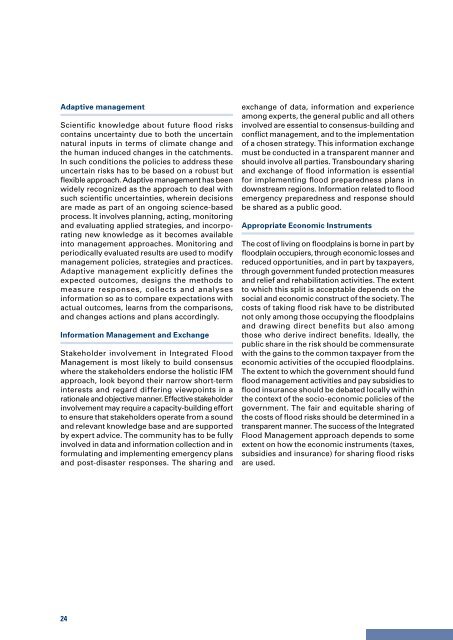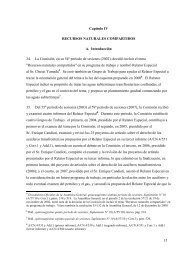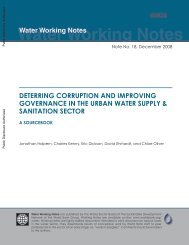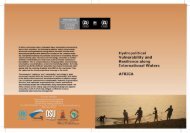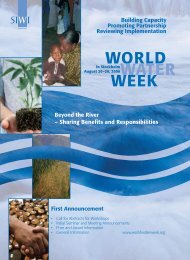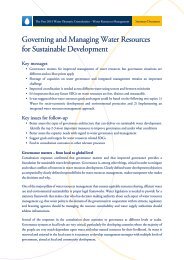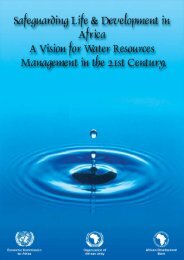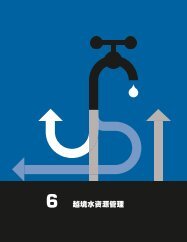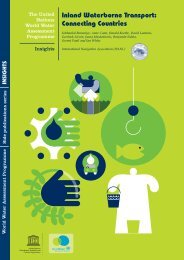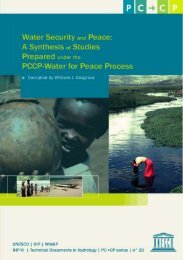Integrated Flood Management-Concept Paper.pdf - APFM
Integrated Flood Management-Concept Paper.pdf - APFM
Integrated Flood Management-Concept Paper.pdf - APFM
You also want an ePaper? Increase the reach of your titles
YUMPU automatically turns print PDFs into web optimized ePapers that Google loves.
Adaptive management<br />
Scientific knowledge about future flood risks<br />
contains uncertainty due to both the uncertain<br />
natural inputs in terms of climate change and<br />
the human induced changes in the catchments.<br />
In such conditions the policies to address these<br />
uncertain risks has to be based on a robust but<br />
flexible approach. Adaptive management has been<br />
widely recognized as the approach to deal with<br />
such scientific uncertainties, wherein decisions<br />
are made as part of an ongoing science-based<br />
process. It involves planning, acting, monitoring<br />
and evaluating applied strategies, and incorporating<br />
new knowledge as it becomes available<br />
into management approaches. Monitoring and<br />
periodically evaluated results are used to modify<br />
management policies, strategies and practices.<br />
Adaptive management explicitly defines the<br />
expected outcomes, designs the methods to<br />
measure responses, collects and analyses<br />
information so as to compare expectations with<br />
actual outcomes, learns from the comparisons,<br />
and changes actions and plans accordingly.<br />
Information <strong>Management</strong> and Exchange<br />
Stakeholder involvement in <strong>Integrated</strong> <strong>Flood</strong><br />
<strong>Management</strong> is most likely to build consensus<br />
where the stakeholders endorse the holistic IFM<br />
approach, look beyond their narrow short-term<br />
interests and regard differing viewpoints in a<br />
rationale and objective manner. Effective stakeholder<br />
involvement may require a capacity-building effort<br />
to ensure that stakeholders operate from a sound<br />
and relevant knowledge base and are supported<br />
by expert advice. The community has to be fully<br />
involved in data and information collection and in<br />
formulating and implementing emergency plans<br />
and post-disaster responses. The sharing and<br />
exchange of data, information and experience<br />
among experts, the general public and all others<br />
involved are essential to consensus-building and<br />
conflict management, and to the implementation<br />
of a chosen strategy. This information exchange<br />
must be conducted in a transparent manner and<br />
should involve all parties. Transboundary sharing<br />
and exchange of flood information is essential<br />
for implementing flood preparedness plans in<br />
downstream regions. Information related to flood<br />
emergency preparedness and response should<br />
be shared as a public good.<br />
Appropriate Economic Instruments<br />
The cost of living on floodplains is borne in part by<br />
floodplain occupiers, through economic losses and<br />
reduced opportunities, and in part by taxpayers,<br />
through government funded protection measures<br />
and relief and rehabilitation activities. The extent<br />
to which this split is acceptable depends on the<br />
social and economic construct of the society. The<br />
costs of taking flood risk have to be distributed<br />
not only among those occupying the floodplains<br />
and drawing direct benefits but also among<br />
those who derive indirect benefits. Ideally, the<br />
public share in the risk should be commensurate<br />
with the gains to the common taxpayer from the<br />
economic activities of the occupied floodplains.<br />
The extent to which the government should fund<br />
flood management activities and pay subsidies to<br />
flood insurance should be debated locally within<br />
the context of the socio-economic policies of the<br />
government. The fair and equitable sharing of<br />
the costs of flood risks should be determined in a<br />
transparent manner. The success of the <strong>Integrated</strong><br />
<strong>Flood</strong> <strong>Management</strong> approach depends to some<br />
extent on how the economic instruments (taxes,<br />
subsidies and insurance) for sharing flood risks<br />
are used.<br />
24


